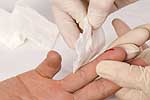| Home A B C D E F G H I J K L M N O P Q R S T U V W X Y Z |
|
Home |
Hypoglycemia: Symptoms,
|
||
|
|

If your doctor tells you that you suffer from hypoglycemia, he must then tell you the cause because low blood sugar is the result of something going wrong in your body. It is not a cause.
Your brain gets more than 98 percent of its energy from sugar in your bloodstream. There is only enough sugar in your bloodstream to last about three minutes, so your liver constantly releases sugar from its cells into your bloodstream. But your liver can store only enough sugar to last 12 hours at rest, so it must manufacture new sugar from protein and other energy stores.
When blood sugar levels drop, you may feel anxious, shaky, sweaty, hungry, a tingling in your skin or your heart may beat rapidly. More severe symptoms include confusion, a sensation of warmth, weakness or fatigue, loss of memory and in its extreme, seizures and passing out. As you suffer repeat attacks of low blood sugar, they affect you less and your symptoms lessen.
There are two types of low blood sugar. First, when your blood sugar rises too high, causing your pancreas to release a large amount of insulin that drops your blood sugar too low, and second, a slow drop in blood sugar caused by your liver running out of stored sugar. Doctors used to think that insulin-induced hypoglycemia follows meals and that your liver running out of sugar doesn't follow meals, but they now know that both types can occur any time.
It is almost impossible to diagnose hypoglycemia by drawing blood after you suffer an attack of dizziness, weakness or fainting because your body produces adrenaline immediately and raises blood sugar levels to normal before your doctor can draw blood. It can be diagnosed by feeding you lots of sugar and measuring your blood sugar level every half-hour for several hours. If you indeed suffer from hypoglycemia, your doctor then has to find a cause, which might include liver damage, an inadequate amount or excess of many different hormones, tumors or glandular abnormalities.
About The Author
Dr. Gabe Mirkin has been a radio talk show host for 25 years and practicing physician for more than 40 years; he is board certified in four specialties, including sports medicine. Read or listen to hundreds of his fitness and health reports at http://www.DrMirkin.com
| OTHER RESOURCES: Hypoglemia: Symptoms, Causes and Treatment on Medicinenet.com Hypoglycemia at MayoClinic.com Hypoglycemia Diet |
|
Glossary References Links Contact
|